By Cristina Cabrera Jarro -
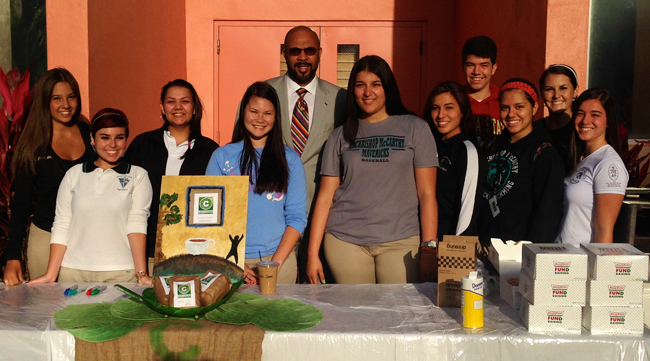
Photographer: COURTESY PHOTO
McCarthy's social entrepreneurship students with Principal Richard Jean at the school's iced Caf� Cocano sale.
The learning took place during a first-of-its-kind course on social entrepreneurship that McCarthy High began offering in January. Principal Richard Jean had been looking for ways to expand the school's business curriculum while adding a Catholic social justice perspective.
At the same time, business teacher Kim Zocco, who is completing her master's at St. Thomas University, was steeped in knowledge about a joint project of the university's Center for Community Engagement and the archdiocesan missionary group Amor en Acci�n: helping the Caf� Cocano growers cooperative in northwest Haiti sell their coffee at fair trade prices.
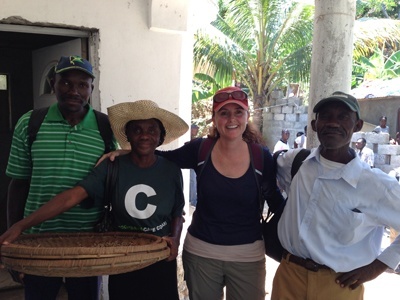
Photographer: COURTESY PHOTO
Archbishop McCarthy social entrepreneurship teacher Kim Zocco poses with members of the Caf� Cocano cooperative in Port de Paix, Haiti.
Inspiration also came from Zocco's colleague at the school, Catherine Kohrt, chair of the Theology Department and moderator of its Justice and Peace Ministry. Kohrt had convinced Zocco to add her business expertise to the high school's Amor en Acci�n club, ultimately resulting in Zocco's own visit to Port-de-Paix to see how fair trade and Caf� Cocano functioned.
Kohrt was diagnosed with a brain tumor last year, and died in April at the age of 54.
"Catherine was great with missionary work," said Zocco, who has taken over as moderator of the Amor en Acci�n club. "I'm just the tech and business-savvy instrument that was handed this teaching legacy. I'm truly blessed and humbled to continue the project with Caf� Cocano and the people of Haiti."
First she taught students about Haiti through the eyes of the Catholic Church and Catholic social teaching. Having met some of the Caf� Cocanos farmers, she shared her experiences with the generosity and humility of the Haitian people.
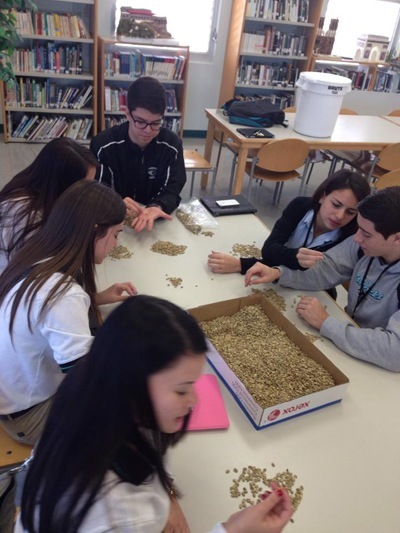
Photographer: COURTESY PHOTO
McCarthy students identify and sort through Caf� Cocano coffee beans.
From presentations by Msgr. Franklyn Casale, president of St. Thomas University, and Wendy Bourgault and Anthony Vinciguerra of the Center for Community Engagement, students learned about the fair trade coffee market, about the coffee farmers in the northwest of Haiti and how to identify quality raw coffee beans for roasting.
"In these coffee growing communities the farmers are paid below poverty level, for a product we pay dearly for," said Zocco.
The average coffee farmer in Haiti works 12 hours a day earning 65 cents to $1 a pound. The farmers involved in fair trade and Caf� Cocano have seen their wage increase by 500 percent, translating to $3.35 per pound of coffee.
"This is such a great accomplishment because we are helping the ones in poverty to get the hard-working money they deserve," said Jovanna Sarduy, a student in Zocco's class. "By cutting out the middle man we have been able to buy the coffee beans straight from the farmers for more money."
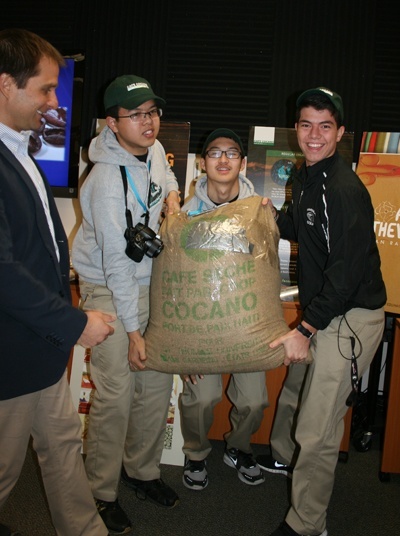
Photographer: COURTESY PHOTO
McCarthy students carry a ready for market 100-pound bag of Caf� Cocano.
"The most memorable part of the project for me was the end product when we were given the opportunity to sell our coffee to the student body and share with them the story of the coffee," said student Natalie Guzman. "Also, to see their enjoyment of the coffee."
"It was heavenly," said Kaylee Suarez, a freshman at McCarthy High. "I bought one every day, and even when I finished mine, my friends would offer me their coffee, and I would finish them, too."
Zocco's student entrepreneurs have already attended their high school graduation, yet the real-life lessons of the Caf� Cocano project will remain with them.
Natalie said the experience is helping her shape her future. "I knew that I wanted to do social work, especially in less developed areas. However, this class showed me how to put these ideas into practice by giving me a hands-on example to work with."
In the meantime, Zoccos classroom remains full of Caf� Cocano waiting to be roasted and sold. She said she looks forward to the legacy that will emerge out of this first social entrepreneurship class.
"Each class will grow and hand off the Caf� Cocano project to the next class. In addition to Catholic social thought, my students have learned that its okay to make a profit as long as youre doing something good and productive for the people and for the planet."
BOX OUT
To purchase fair trade Caf� Cocano, contact Kim Zocco at [email protected] or Anthony Vinciguerra, director of the Center for Community Engagement at St. Thomas University, at 305-628-6717 or [email protected].
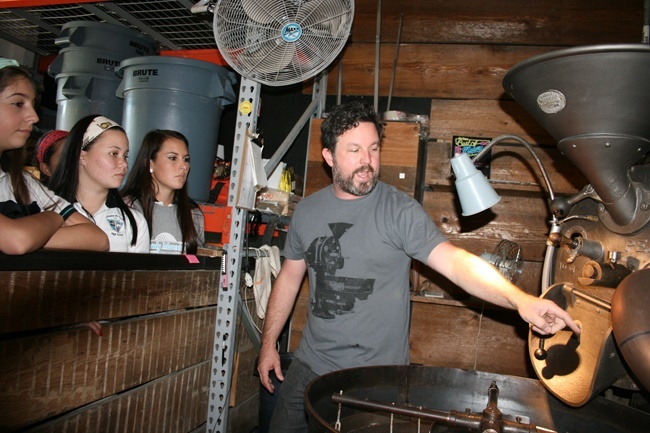
Photographer: COURTESY PHOTO
Joel Pollock of Panther Coffee shows Archbishop McCarthy students how the Caf� Cocano coffee they brought in is roasted.


Comments from readers